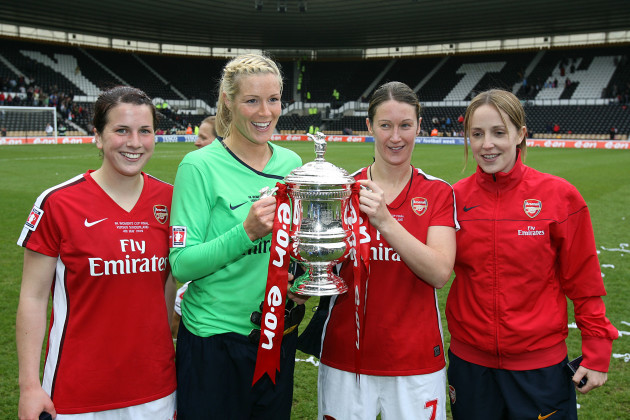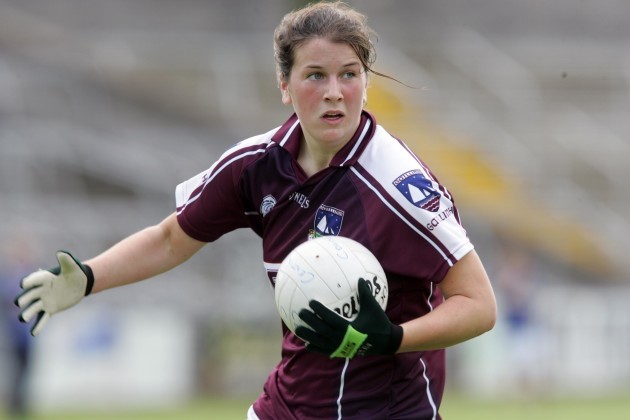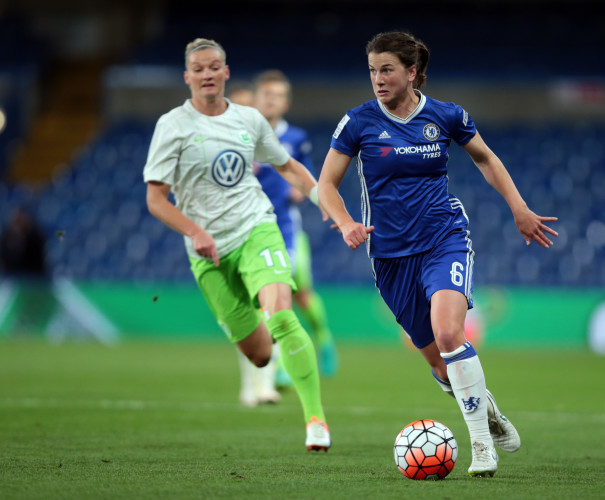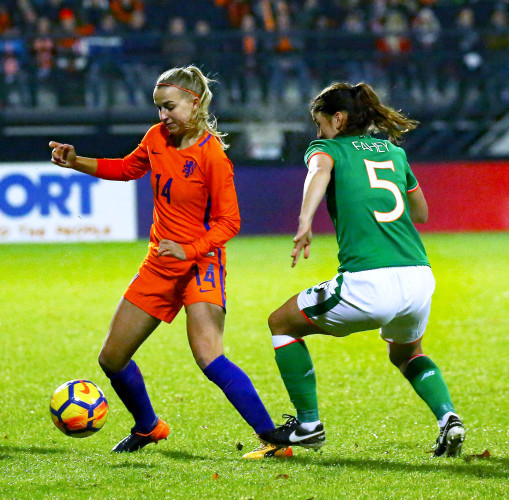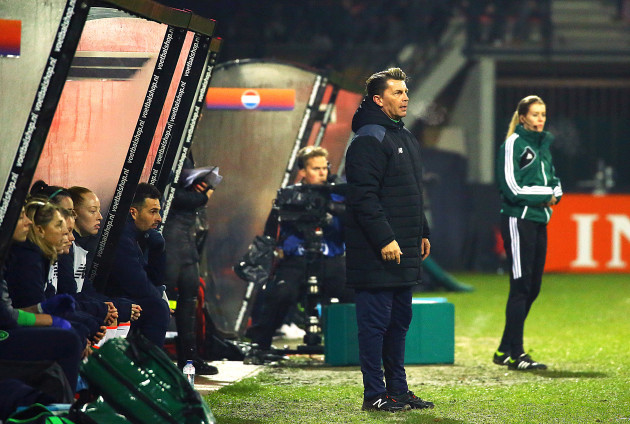AFTER NEARLY A decade spent winning silverware in English football, Niamh Fahey was ready for a change of scenery.
Having joined an all-conquering Arsenal team from local club Salthill Devon in 2008, she lifted five league titles, five FA Women’s Cups and three league cups with the Gunners.
There was a strong Irish contingent at the London club for much of that period as Fahey could count on the country’s all-time record caps holder Emma Byrne, defender Yvonne Tracy and midfielder Ciara Grant as team-mates.
Chelsea had ambitions to muscle in on Arsenal’s dominance and recruited the defender, who has also been deployed in midfield throughout her career, in 2015. It paid dividends as they won a first-ever league/FA Cup double the following season — with Fahey and Gilly Faherty forming a rock-solid partnership at centre-half.
Played in front of 30,000 fans at Wembley Stadium, the cup final victory was particularly special as the Blues overcame Notts County meaning the Ireland stalwart lifted the trophy for a fifth time.
However, an injury picked up last season was to effectively spell the end of her Chelsea career. Fahey, the sister of ex-inter-county captain Gary and a former Galway footballer herself, was no longer automatically first-choice and that didn’t sit well.
“I was never used to not starting or not being involved in every game,” the 30-year-old tells The42. “I had just come back from injury and it was difficult to get playing. I was getting frustrated and probably wasn’t happy for a good few months. I knew then that it wouldn’t work going forward if I was back fit and not playing.
“I didn’t want to be sitting on the sidelines, so that was it really. I had to make a decision whether to stay and be a squad player or move somewhere and play regularly.”
There were options to remain in the Women’s Super League (WSL), but Fahey felt like the time was right to try her luck elsewhere.
I had a few opportunities and couple of clubs were thrown around but at this point I had been over in England a long time and I was excited to go and try something else — a different style, a different culture and a different language. It was more for the cultural challenge and new experience as well as the football. It took my fancy more than staying put.
“Bordeaux came up as an option so I had a chat with them and it seemed like a good thing to go and try.”
Relocation to France looked a solid option. European heavyweights Lyon are the current Women’s Champions League holders, the top flight (Division 1 Féminine) is highly-regarded and the French national team — many of whom play domestically — are ranked third in the world by Fifa.
But the Bordeaux project is in its infancy, as Fahey explains.
“They’re relatively new in terms of being a full-time professional outfit. This is their second year in D1 and last year they just survived it.
“The club has pumped in a lot of investment with the aim to professionalise things. You can still see they’re at the point of moving from completely amateur to getting up to a full-scale professional set-up. It’s going to take a while but we’re playing some good football so it is paying off.
“In terms of facilities and stuff, we’ve got a long way to go. It’s not up the calibre we had at Chelsea and even when we’ve been to other grounds we see what they have and there’s a bit to go. But they’re bridging the gap and it’s a project in progress.”
Although UCD Waves midfielder Chole Mustaki had a spell in Bordeaux, their current squad is mainly made up of homegrown players with a sprinkling of foreigners.
“The majority of the players at the minute are French,” Fahey explains. “There are three of us who are foreign internationals. Luckily enough, they are English-speaking. The girls are from New Zealand and Brazil, but she has gone through American college and has good English.
“The club went out of their way to get internationals in and to increase the level within the French group there needs to be a different dynamic. It’s about adding a mix and that helps the team.”
It has been five months since Fahey made the move and so far it has gone well. Bordeaux sit fifth in the table at the time of writing and she has started in all but one of their 10 league matches.
Good, but it has been difficult at times,” Fahey replies, when asked how she has adjusted to life in France. “At the start, I found it very tough with the language barrier. The French have a completely different way of doing things, which also took a while to get used to.
“Now that I’ve settled in I’m really starting to enjoy it and I’m lucky with where I’m living as it’s a really nice area. They girls are great and they have been extremely helpful. It has been a really good experience so far.”
Her deal was for one year initially with the option of a second so there will be a decision to make about next season in the coming weeks and months.
“So far so good but I have to think about what I want to do — whether I want to stay or go,” she says. “It’s always like that in football, you have to weigh things up. It’s early days so we’ll see. ”
While it has been all change at club level, 2017 was also a particularly eventful year for Fahey and the Ireland team.
The squad’s decision to strike over working conditions back in April was a low point for women’s football in this country, but the group has come out the other side better for it.
Improvements have been made across the board and it looks like exciting times as manager Colin Bell brings through several talented, young players such as 16-year-old midfielder Tyler Toland, who has acquitted herself excellently in recent qualifiers.
There has been a whole regeneration because the previous squads were that bit older. Now you see the talent that’s coming through at underage and they are more than capable of playing at this level.
“It’s good that they’re in early and that they’re getting involved in the set-up so young. They’ll be more than ready to progress when the next campaign comes around or even before that.
“They’ve shown already that they’re able to step in — with Tyler and the likes impressing. It’s what you want. Us older ones are there for the bit of wisdom and to help them so it’s an exciting time.”
She also speaks extremely highly about Englishman Bell, who has enjoyed a hugely-promising start to his career in charge of the Girls in Green.
“Colin has brought a real professionalism into the set-up,” she says. “It’s just at another level now.
“I don’t think there’s any difference now between being away at any professional club and coming here. It’s ultra professional, that’s great for the young girls to have this set-up and hopefully it can get us to a tournament.
“With his experience, he knows where the bar is at. He’s very vocal at times and maybe the players aren’t used to it but it’s also good because tough love is the best love. If the standard isn’t up to scratch, it’s great to be able to have someone pushing you up to that bar.”
The end goal is to become the first Ireland women’s team to qualify for a major tournament, and the current World Cup campaign has begun brightly. After impressive away wins over Northern Ireland and Slovakia, they travelled to Nijmegen to face European champions the Netherlands last month.
Despite being without several first-team regulars, Ireland put in a heroic defensive performance to come away with a 0-0 draw as the Dutch spurned numerous chances before having a late penalty shout waved away.
The two nations sit level on seven points after three matches played, but with just the group winners qualifying (and the four best-placed runners-up going into play-offs), there is still a long way to go.
It’s been a great start and there’s a feel-good factor,” says Fahey.
“I suppose when everyone outside the squad looked at this group they would have thought we had no chance. The idea would be that this is a building phase.
“But within the squad, that’s not how we’re thinking. Although we’re in a tough group we’ve started well and we firmly believe we can get results and push it all the way.
“In terms of progressing, it’s a realistic ambition to be qualifying for tournaments. You just have to look at the amount of players coming through, how it’s developing and what age they’re playing international football at. We’ll be expected to qualify.
“I think the public should get behind it because it’s going to be something that will be there in the future — Ireland will be going to senior international tournaments in the future for sure.”
Women’s football in England was rocked by a fall-out this year involving national team manager Mark Sampson, who was found guilty of racially abusing players Eni Aluko and Drew Spence on the third time of asking in October.
Sampson had been sacked the previous month after it had come to light that he was involved in “inappropriate relationships” with female players in his previous role at Bristol’s Academy.
Fahey played alongside Aluko at Chelsea and believes the whole episode reflects badly on the sport.
“It’s a tough one to comment on because I know Eni as a friend and a team-mate, having been around her for a long time,” she says. “I have good time and respect for her but the whole thing in general seems a bit bizarre in terms of how it was handled by the FA and ultimately what led to his [Sampson's] sacking.
“It all sounds a bit dodgy to be honest and I don’t really know what was going on. There’s always something behind the scenes and I was just reading it like anyone else as I never spoke to her about it.
“It was a bit of a comedy of errors in terms of how it was looked at. You don’t want to see things like that because it tarnishes women’s football in general and you don’t want to have so-called sleazy people involved in the game for the wrong reason.
“Although things have improved, you can never be 100% sure about anyone.”
The42 has just published its first book, Behind The Lines, a collection of some of the year’s best sports stories. Pick up your copy in Eason’s, or order it here today (€10):
